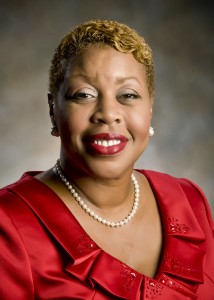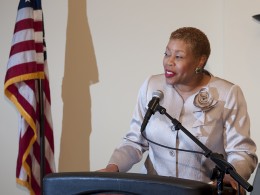
Kimberly Barrett, Wright State University’s new Vice President—Multicultural Affairs and Community Engagement
On her office wall is a Norman Rockwell painting that has traveled with Kimberly Barrett over the years. Titled “Golden Rule,” the well-known, instantly recognizable painting by the iconic artist features a gallery of people of all nationalities.
It is a fitting inspiration for Barrett, who is Wright State University’s new Vice President—Multicultural Affairs and Community Engagement.
“It just seems like a wonderful illustration of all kinds of diversity—racial, religious,” said Barrett, Ph.D. “It sort of captures my ultimate vision.”
Barrett’s current vision is to increase and strengthen diversity at Wright State. The benefits of diversity, she says, include extending the school’s reach for talented faculty and staff.
“If you really want to have the best and the brightest, you need to have the broadest pool of people who are applying and working at your university,” she said.
In addition, Barrett says, comprehensive diversity enhances the learning of all students, especially those in the majority.
“It increases their cognitive complexity, critical thinking, leadership skills—lots of things people now know are important to being effective not just in the classroom, but outside the classroom after they graduate,” she said.
Barrett, who arrived here in August, said student diversity is pretty good at Wright State. But like many universities, she said, the school could increase diversity among faculty and employees.
Barrett plans to establish a series of mini-grants to encourage faculty and staff to forge relationships with outside minority scholars and organizations and get them to come to the campus.
“Then people will think this is a place where they might want to be,” she said.
Barrett also wants to eliminate any biases in the search process among university committees charged with finding and hiring new administrators and faculty members.
Barrett has already implemented listening sessions with faculty, staff and students. She plans to have a student advisory committee and to re-energize Quest, Wright State’s annual conference on diversity issues in higher education.
“Quest is a great opportunity,” she said. “It’s seen by the higher-education community and the local community as THE regional diversity conference.”
Barrett said the real key to keeping issues of diversity and community engagement on the university radar is to institutionalize them by making them part of staff orientation and performance evaluation. Then, they have to be measured and periodically adjusted in order to maximize progress.
Barrett has a fierce independence and steely determination that came from growing up in an Army family in Columbia, S.C. Her father, Phillip, was a drill sergeant who gave his children clear and detailed instructions about pretty much everything.
“That’s what pushed me into doing things my own way,” Barrett said.
Barrett developed an interest in education as a child. She would collect extra worksheets from her teachers, bring them home, and play schoolteacher in her backyard.
“I thought this was the most important thing you could do—be a teacher and help people learn things,” she said.
Barrett later discovered psychology, seeing it as a profession where she could still change the lives of people but have more autonomy.
She graduated from high school a year early and enrolled at Pfeiffer University in Misenheimer, N.C., graduating early with a bachelor’s degree in psychology.
Barrett began working in community mental health, took a job in the counseling center at Murray State University in Murray, Ky., and obtained her master’s degree in clinical psychology there. During that time, she discovered there were opportunities to make a difference in the higher-education environment.
“I never thought I would end up working in the Ivory Tower for my career,” she said.
Barrett went on to obtain her Ph.D. in higher education administration from Southern Illinois University. After that, there were a blur of university jobs that gave her a tour of North America.
She served as associate vice chancellor of Student Development and Diversity at the University of Wisconsin—Eau Claire; vice provost at Lakehead University in Thunder Bay, Canada; associate provost and dean of students at Southeast Missouri State University; and director of Multicultural Affairs at SUNY Potsdam (N.Y.) College.
Most recently, Barrett was vice president for student affairs at the University of Montevallo, a liberal arts school in Montevallo, Ala. Her philosophy was to “meet students where they were” by developing web-based communications and organizing fireside chats and pizza-party talk sessions. She also helped upgrade residence halls, oversaw efforts to develop a service-learning center and helped create a learning enrichment center for students to get tutoring and other academic assistance.
During her time at Montevallo, Barrett wrote a monthly column in the Shelby County Reporter on social and economic justice issues.
“I was kind of a different voice in a very conservative area,” she said. “I had a more progressive take on things.”
Barrett considers herself to be a black feminist.
“Not because I happen to be African-American, but because the tradition of black feminist thought links all issues of inequality and justice together,” she said. “It really emphasizes the intersection of race, class, gender, sexual orientation together and says sort of like Martin Luther King, ‘If one of us isn’t free, none of us is free.’”
During her brief time at Wright State, Barrett has been heartened by the welcome and overwhelming support.
“People have been wonderful about offering assistance and ideas and willingness to work with me on things,” she said. “I don’t really have a Rolodex, but if I had one, it would be overflowing with cards.”
Barrett said the biggest challenge in trying to increase and strengthen diversity is overcoming a natural resistance from people who see it as a threat to their own identity.
“I think most people are trying to do what’s right, but because it’s about issues of identity, they take it personally,” she said. “Diversity is something that I think is deeply important to our society and is essential in achieving excellence in higher education.”


 Glowing grad
Glowing grad  Wright State’s Homecoming Week features block party-inspired events Feb. 4–7 on the Dayton Campus
Wright State’s Homecoming Week features block party-inspired events Feb. 4–7 on the Dayton Campus  Wright State music professor honored with Ohio’s top music education service award
Wright State music professor honored with Ohio’s top music education service award  Wright State’s Industrial and Human Factors Engineering program named one of top online graduate programs by U.S. News
Wright State’s Industrial and Human Factors Engineering program named one of top online graduate programs by U.S. News  Student-run ReyRey Café celebrates decade of entrepreneurship at Wright State
Student-run ReyRey Café celebrates decade of entrepreneurship at Wright State 